Did you know that grilled vegetables are not just a trendy BBQ side dish, but also a delicious and nutritious option enjoyed by millions? In fact, according to a recent study, over 65% of Americans include grilled vegetables in their barbecues and outdoor cookouts. It’s no wonder why more and more people are discovering the flavorful wonders of vegetable barbecue.
In this article, I’ll share expert tips and tricks to help you achieve grilled vegetable perfection. From understanding the importance of smoke, char, and caramelization to selecting the right vegetables, mastering grilling techniques, and serving up delectable BBQ vegetable recipes, we’ll cover everything you need to know to elevate your veggie game.
Key Takeaways:
- Create a high-heat grilling environment to intensify flavors.
- Wash, trim, and season your vegetables before grilling.
- Adjust grilling techniques and cooking times for different vegetables.
- Explore a variety of delicious BBQ vegetable recipes.
- Use the right grilling tools for a seamless grilling experience.
The Importance of Smoke, Char, and Caramelization
When it comes to grilling, smoke, char, and caramelization are more than just visual elements – they play a crucial role in enhancing the flavor of grilled foods. Understanding the science behind these processes can help you create mouthwatering BBQ vegetables.
Smoke is more than just a byproduct of grilling; it adds depth and complexity to the flavor profile of your vegetables. As the smoke molecules penetrate the vegetables, they infuse a delightful smoky essence that is sure to tantalize your taste buds.
Char, on the other hand, is all about achieving that desirable outer crust. When the vegetables come into contact with the high heat of the grill, their natural sugars undergo caramelization, resulting in the development of rich, sweet flavors and a beautiful charred appearance.
But the magic doesn’t stop there. The Maillard reaction, a biochemical process that occurs when the amino acids and sugars in the vegetables react to heat, is responsible for creating the distinct flavors and aromas. This reaction produces hundreds of different compounds that contribute to the overall savory taste and mouthwatering aroma of your grilled vegetables.
By understanding and harnessing the power of smoke, char, and caramelization, you can elevate your BBQ vegetables to new levels of flavor. Incorporating these elements into your grilling process will ensure that each bite is a symphony of deliciousness that combines the earthiness of the vegetables with the smokiness, sweetness, and savoriness created through these processes.
So, the next time you fire up the grill, remember to embrace the dance of smoke, char, and caramelization. Your taste buds will thank you for it!
Creating the Perfect Grilling Environment
To achieve the best flavors when grilling vegetables, it’s crucial to create the perfect grilling environment. This includes having a high heat, preferably around 600 degrees Fahrenheit, to intensify the flavors. Creating different grill zones, such as a hot zone, a moderate zone, and a no-flame zone, allows for precise cooking and flavor development.
Having a high grilling temperature is key to achieving deliciously grilled vegetables. The intense heat creates a wonderful sear on the outside while locking in the natural juices, resulting in a charred and smoky flavor that tastes incredible. Aim for a temperature of around 600 degrees Fahrenheit to create the perfect grilling environment.
Additionally, creating different grill zones is essential for achieving optimal results. By designating specific areas for different levels of heat, you can control the cooking process and flavor development of each vegetable. Here’s a breakdown of the grill zones:
| Grill Zone | Heat | Usage |
|---|---|---|
| Hot Zone | High Heat | Ideal for searing and charring vegetables quickly. |
| Moderate Zone | Medium Heat | Perfect for cooking vegetables to a tender and juicy consistency. |
| No-Flame Zone | Indirect Heat | Used for gentle cooking and keeping vegetables warm without direct exposure to flames. |
Note: If your grill does not have separate gas burners or charcoal areas, you can create these zones by adjusting the distance between the vegetables and the heat source.
Image: The different grill zones for precise cooking and flavor development.
Selecting and Preparing the Vegetables
When it comes to grilling vegetables, the possibilities are endless. Nearly any vegetable can be transformed into a delicious grilled masterpiece. However, some popular choices that are sure to impress your taste buds include zucchini, bell peppers, eggplant, and mushrooms.
Before grilling, it’s important to properly prepare your vegetables. Start by washing them thoroughly to remove any dirt or debris. Trim off any stems, roots, or leaves that may not be palatable. This will ensure that your vegetables are clean and ready to be grilled.
Now comes the fun part – seasoning! Enhance the natural flavors of your vegetables with a simple yet flavorful combination of olive oil, salt, and pepper. The olive oil will add a subtle richness and prevent the vegetables from sticking to the grill. Don’t be shy with the salt and pepper, as they will help bring out the inherent flavors of the vegetables.
“Grilling vegetables allows you to bring out their natural sweetness and create a delicious smoky flavor. When combined with the right seasonings, it’s a culinary delight!”
To summarize, when selecting and preparing your vegetables for grilling:
- Choose popular options like zucchini, bell peppers, eggplant, and mushrooms.
- Wash the vegetables thoroughly and trim as needed.
- Season with olive oil, salt, and pepper to enhance the flavors.
| Vegetable | Preparation |
|---|---|
| Zucchini | Wash, trim ends, and slice into uniform pieces. |
| Bell Peppers | Wash, remove seeds and membranes, and slice into quarters or strips. |
| Eggplant | Wash, trim ends, and slice into rounds or cubes. |
| Mushrooms | Wash, remove stems if desired, and keep whole or halve depending on size. |
Tips for Grilling Different Vegetables
Grilling vegetables is an art that requires attention to detail, particularly when it comes to understanding the specific grilling techniques and cooking times for each vegetable. By mastering these tips, you can achieve perfectly grilled vegetables bursting with flavors. Here are some key considerations to keep in mind:
1. Direct Heat vs. Indirect Heat
When grilling vegetables, the choice between direct and indirect heat can make a significant difference in the final result. Thicker vegetables like zucchini and eggplant benefit from cooking over indirect heat to ensure they are fully cooked without burning. This method allows for a slow and even cooking process, resulting in tender and delicious vegetables.
2. Proper Slicing and Skewering
The way you slice and skewer vegetables can impact their cooking time and overall texture. For slender vegetables like asparagus or green beans, keeping them whole or in long bundles can help prevent them from falling through the grates. On the other hand, larger vegetables like peppers or onions can be sliced into thick rings or chunks for even grilling.
3. Marinating for Flavor Enhancement
Marinating vegetables before grilling can infuse them with incredible flavors. Opt for marinades that complement the natural taste of the vegetables, such as a simple combination of olive oil, garlic, herbs, and citrus juice. Marinating for at least 30 minutes allows the flavors to penetrate the vegetables, resulting in a more robust and savory dish.
4. Consider Cooking Times
Each vegetable has its own cooking time, and it’s crucial to pay attention to prevent undercooking or overcooking. For example, delicate vegetables like cherry tomatoes or mushrooms may only need a few minutes on the grill, while denser vegetables like potatoes or butternut squash may require more time to become tender. It’s helpful to refer to cooking charts or recipes specific to the vegetables you are grilling.
5. Use Grill Baskets for Small or Delicate Vegetables
Small or delicate vegetables, such as diced onions or cherry tomatoes, can easily fall through the grates. Using a grill basket can prevent this and make grilling these vegetables much more manageable. The grill basket allows you to toss and turn the vegetables without losing any pieces or risking charring.
Having a good understanding of these grilling techniques and cooking times will elevate your vegetable grilling game. Experiment with different vegetables, flavors, and cooking methods to discover exciting combinations that will delight your taste buds.
Grilling Vegetable Recipes
To inspire your grilling adventures, here are some delicious BBQ vegetable recipes. From grilled zucchini to perfect grilled aubergine, these recipes offer a range of flavors and textures that will satisfy both veggie-lovers and meat-eaters alike. Experiment with different combinations and seasonings to create your own grilled veggie platter.
Try these mouth-watering BBQ vegetable recipes:
- Grilled Zucchini Salad with Lemon-Herb Dressing
- Charred Bell Peppers with Balsamic Glaze
- Grilled Portobello Mushroom Burgers with Caramelized Onions
- Spicy Grilled Corn on the Cob
- Grilled Asparagus with Parmesan Cheese
Whether you’re hosting a backyard BBQ or looking for a healthy and flavorful side dish, these grilled vegetable recipes will impress your guests and add a burst of flavor to your meals. Get creative with your veggie choices and explore different marinades and seasonings to elevate your grilling game.
“Grilling vegetables unleashes their natural flavors and adds a delicious smoky edge to any dish.”
– Chef Emily Thompson
Don’t forget to explore our other sections for more tips and tricks on grilling vegetables, common mistakes to avoid, and essential tools for your grilling arsenal.
| Recipe | Preparation Time | Cooking Time | Difficulty |
|---|---|---|---|
| Grilled Zucchini Salad with Lemon-Herb Dressing | 15 minutes | 10 minutes | Easy |
| Charred Bell Peppers with Balsamic Glaze | 15 minutes | 15 minutes | Medium |
| Grilled Portobello Mushroom Burgers with Caramelized Onions | 20 minutes | 15 minutes | Medium |
| Spicy Grilled Corn on the Cob | 10 minutes | 15 minutes | Easy |
| Grilled Asparagus with Parmesan Cheese | 10 minutes | 8 minutes | Easy |
Common Mistakes to Avoid when Grilling Vegetables
Grilling vegetables is a delightful way to add flavor and variety to your meals. However, it’s essential to be aware of common mistakes that can hinder the taste and texture of your grilled vegetables. By avoiding these errors, you can ensure that your vegetables turn out perfectly grilled every time.
Oiling the Vegetables instead of the Grates
One of the most significant mistakes people make when grilling vegetables is oiling the vegetables directly instead of oiling the grill grates. By doing so, the excess oil on the vegetables can lead to unpleasant flavors and an oily texture. Instead, it’s crucial to oil the grill grates before placing the vegetables on them. This allows for a better sear and helps prevent sticking.
Preventing Sticking
Another common issue when grilling vegetables is sticking to the grates. To prevent this, it’s essential to properly oil the grill grates. Before placing the vegetables on the grill, lightly brush the grates with oil or use a non-stick cooking spray. This will create a barrier between the vegetables and the grates, making it easier to flip and remove them without sticking.
“One of the most significant mistakes people make when grilling vegetables is oiling the vegetables directly instead of oiling the grill grates.”
By oiling the grates and preventing sticking, you can achieve beautifully grilled vegetables that are easy to handle and have a delicious charred exterior.
Common Mistakes to Avoid when Grilling Vegetables
| Mistake | Explanation |
|---|---|
| Oiling the vegetables instead of the grates | Oiling the vegetables directly can result in unpleasant flavors and a greasy texture. It’s important to oil the grates to achieve a better sear. |
| Preventing sticking | Properly oiling the grill grates helps prevent vegetables from sticking, making them easier to flip and remove without damaging their texture. |
By avoiding these common mistakes and following the proper techniques for oiling the grates and preventing sticking, you can master the art of grilling vegetables and create flavorful, perfectly grilled dishes that will impress your family and friends.
Essential Tools for Grilling Vegetables
Grilling vegetables is not only a culinary delight, but it’s also an experience that can be enhanced with the right tools. As someone who loves grilling vegetables, I’ve found that having the essential grilling tools truly makes a difference in achieving those perfectly grilled veggies. Here are the tools that I always have by my side:
- Grill Brush: Keeping the grill grates clean is essential for optimal grilling. A sturdy grill brush helps remove any buildup or residue, ensuring a clean and sanitary cooking surface for your vegetables. With a clean grill, your vegetables will cook evenly and won’t stick to the grates.
- Tongs: A good pair of tongs is a must-have for grilling vegetables. Tongs provide the necessary control and precision to flip and turn the veggies without damaging them. Look for tongs with long handles to keep your hands a safe distance from the heat.
- Skewers: Skewers are perfect for grilling small pieces of vegetables, such as cherry tomatoes, mushrooms, or diced bell peppers. They allow for easy handling and even cooking, ensuring that every piece is grilled to perfection.
- Grill Basket: When grilling delicate or small vegetables like asparagus or sliced onions, a grill basket is a game-changer. It prevents the veggies from falling through the grates while still allowing them to get that smoky char. The grill basket helps you grill these delicate veggies with ease and precision.
Equipped with these essential grilling tools, you’ll be well-prepared to create mouthwatering grilled vegetables that will impress your guests. Trust me, the right tools make all the difference.
Now that we have the necessary tools, let’s explore some exciting seasoning and serving tips for grilled vegetables. Because no perfectly grilled vegetable dish is complete without the right flavors and finishing touches!
Tips for Seasoning and Serving Grilled Vegetables
Seasoning plays a crucial role in enhancing the flavors of grilled vegetables. To take your barbecued veggies to the next level, try these seasoning options that will elevate the taste and add a burst of freshness to your dish.
1. Kosher Salt, Black Pepper, and Dried Herbs
One of the simplest ways to season grilled vegetables is by sprinkling them with a combination of kosher salt, freshly ground black pepper, and your choice of dried herbs. The salt will enhance the natural flavors of the vegetables, while the black pepper adds a subtle kick of spice. Dried herbs like thyme, rosemary, or oregano can provide additional aroma and depth of flavor.
2. Citrus Zest
For a bright and tangy flavor, try grating the zest of citrus fruits such as lemons, oranges, or limes over your grilled vegetables. The citrus zest adds a refreshing twist and complements the smoky notes from the grill.
3. Spice Blends
Experiment with different spice blends to create unique flavor profiles for your grilled vegetables. You can use pre-made spice blends like Cajun, Italian seasoning, or chili powder, or create your own custom blend by combining various spices like cumin, paprika, garlic powder, and onion powder.
4. Finishing Touches with Fresh Herbs
To add a final touch of freshness, consider topping your grilled vegetables with chopped parsley or other fresh herbs like cilantro, basil, or mint. The vibrant colors and crisp flavors will make your grilled veggies visually appealing and even more delicious.
Remember, the key to finding the perfect seasoning for your grilled vegetables is to experiment with different combinations and serving suggestions. Get creative, trust your taste buds, and discover the flavors that excite you!
| Seasoning Option | Flavor Profile |
|---|---|
| Kosher Salt, Black Pepper, and Dried Herbs | Enhances natural flavors with subtle aromatic notes |
| Citrus Zest | Delivers a bright and tangy taste |
| Spice Blends | Creates a variety of unique and bold flavor combinations |
| Finishing Touches with Fresh Herbs | Adds a burst of freshness and visual appeal |
Grilled Vegetables: A Healthy and Flavorful Option
When it comes to healthy grilling, grilled vegetables are an excellent choice. Not only do they provide delicious flavors, but they also offer numerous nutritional benefits. Incorporating grilled vegetables into your diet can help you maintain a balanced and nutritious eating lifestyle.
Grilled vegetables are low in calories, making them a great option for those looking to watch their calorie intake. They are also high in fiber, which aids in digestion and helps you feel fuller for longer. By including grilled vegetables in your meals, you can enjoy a satisfying and nutritious dish without sacrificing flavor.
What sets grilled vegetables apart is their abundance of essential vitamins and minerals. They are packed with nutrients like vitamin A, vitamin C, potassium, and folate, which are vital for overall health and well-being. These vegetable nutrients support proper immune function, promote healthy skin, and contribute to heart health.
As an example, one cup of grilled bell peppers provides a significant amount of vitamin C, which is essential for collagen production and boosting your immune system. Grilling also helps to retain the natural flavors and nutrients of vegetables, making them even more enjoyable to eat.
Including a variety of vegetables in your grilling repertoire allows you to benefit from the different nutrients they offer. Try grilling a colorful medley of bell peppers, zucchini, and eggplant to get a range of vitamins and minerals in one delicious dish.
The Health Benefits of Grilled Vegetables:
- Low in calories
- High in fiber
- Packed with essential vitamins and minerals
- Supports immune function
- Promotes healthy skin
- Contributes to heart health
Grilling vegetables is not only a flavorful cooking method, but it also allows you to enjoy the nutritional benefits they offer. So fire up the grill and savor the deliciousness and wholesomeness of grilled vegetables!
Conclusion
In conclusion, grilling vegetables is not only a delicious way to enjoy nutritious food, but it also brings out the natural flavors and adds a smoky touch to your dishes. By understanding the importance of smoke, char, and caramelization, you can create veggie masterpieces that will impress your friends and family.
Start by selecting the right vegetables and giving them some basic preparations, such as washing and trimming. Season them with olive oil, salt, and pepper to enhance their taste. Then, master the art of grilling by creating the perfect grilling environment with high heat and different grill zones.
Remember to use the essential tools like a grill brush, tongs, skewers, and a grill basket to ensure easy and safe grilling. Experiment with different grilling techniques and cooking times to achieve the desired results for each vegetable. Finally, season and serve your grilled vegetables with a variety of seasonings and finishing touches to elevate their flavors.
So, whether you’re looking for a healthy and flavorful option or simply want to enjoy the abundance of nature’s bounty, grilling vegetables is a fantastic choice. With these expert tips and recipes, you can confidently create perfectly grilled vegetables that will tantalize your taste buds and satisfy your cravings. Get ready to fire up the grill and take your veggie game to the next level!

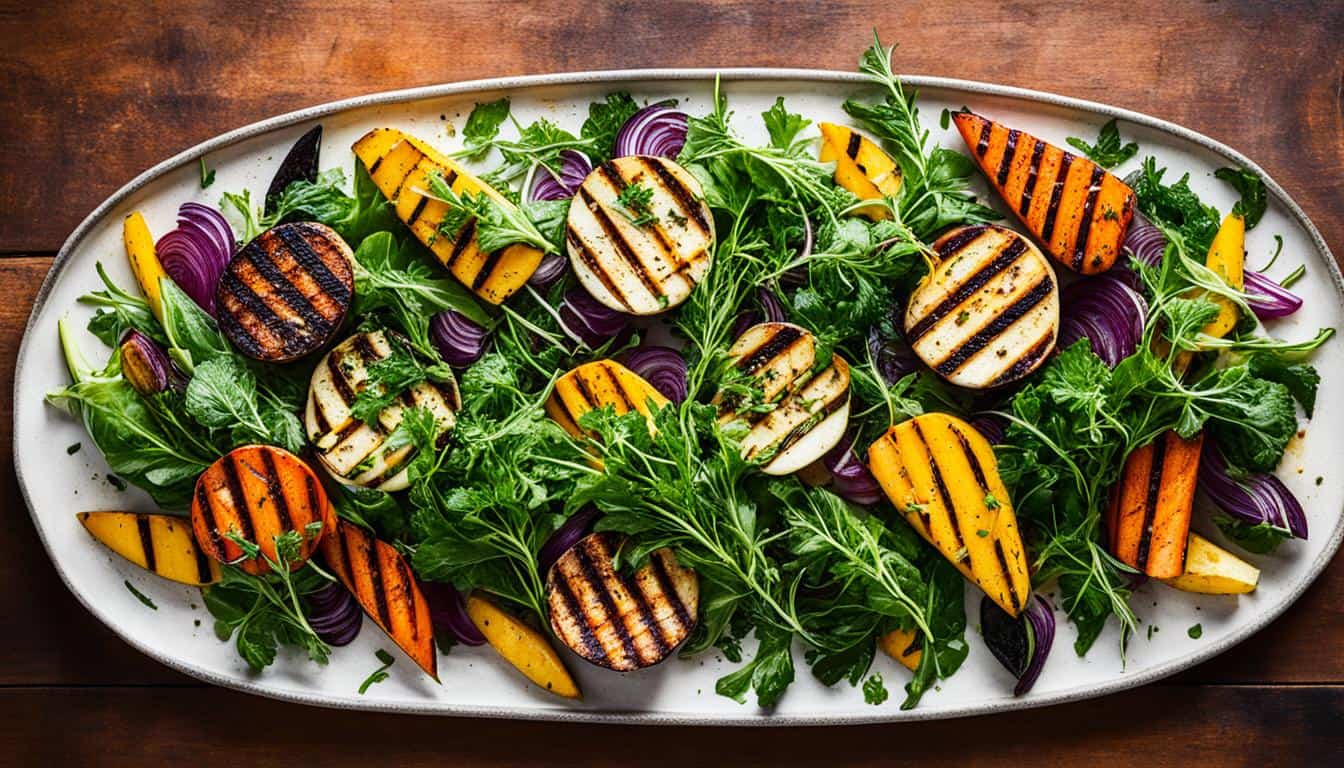
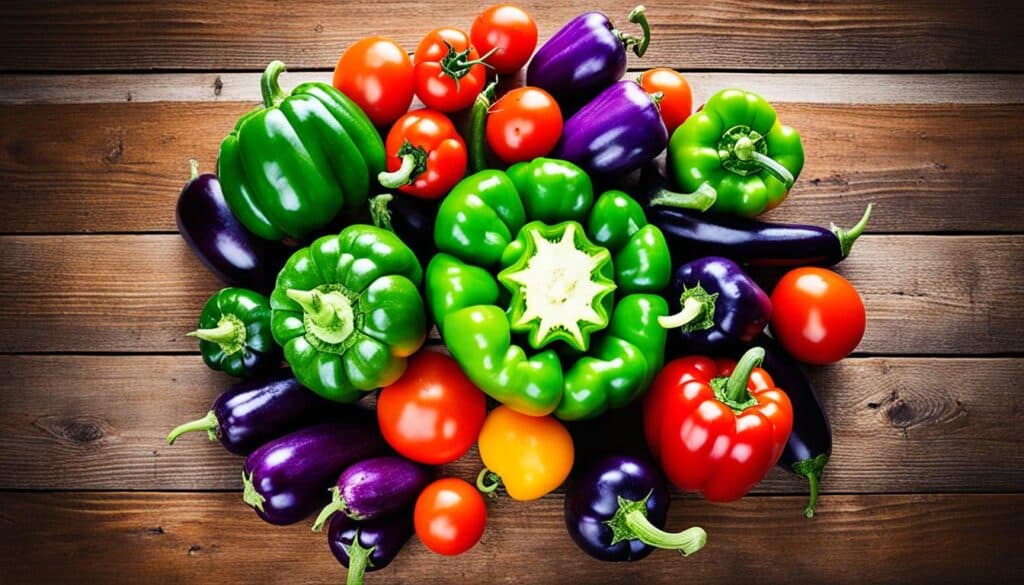
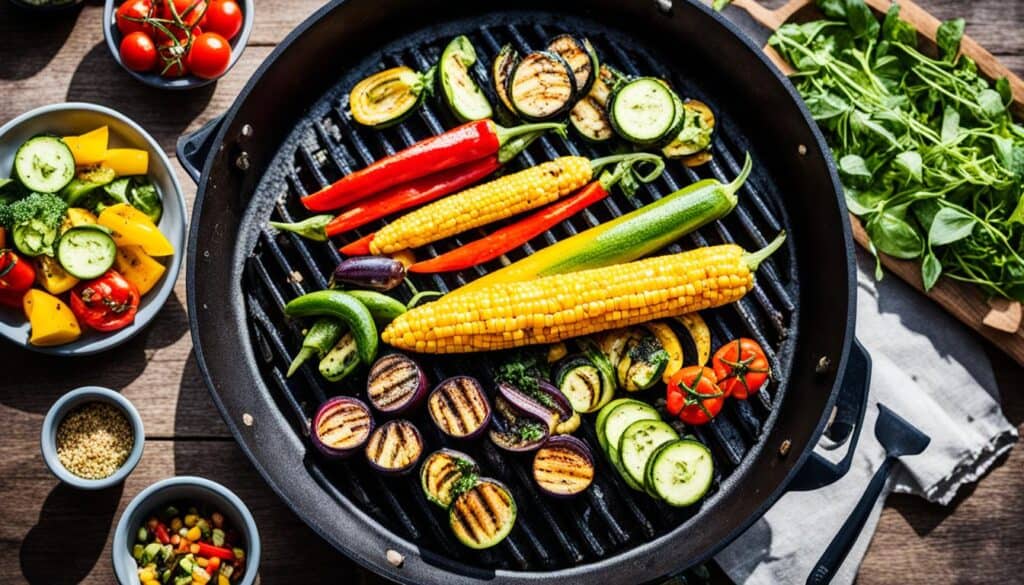
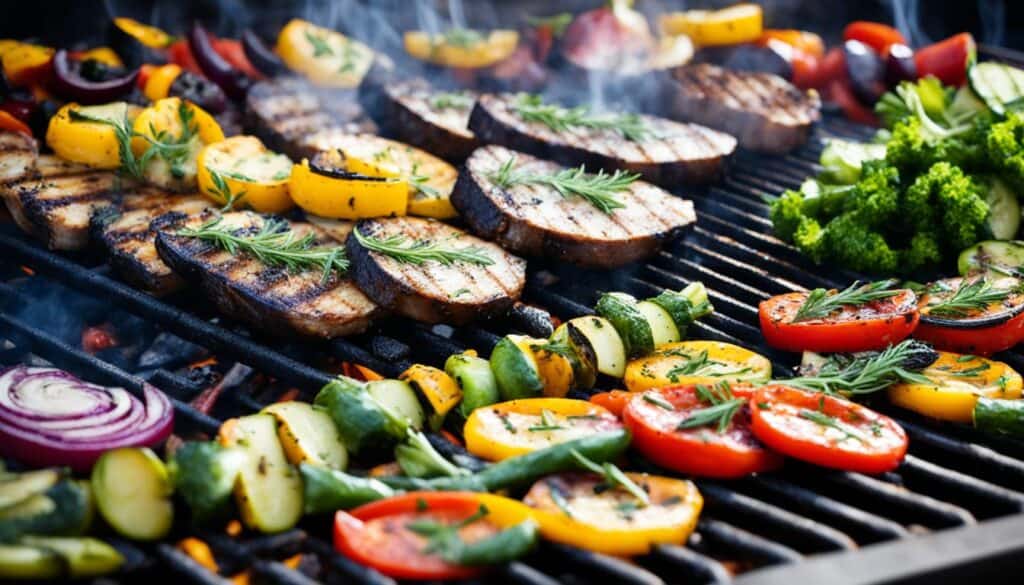
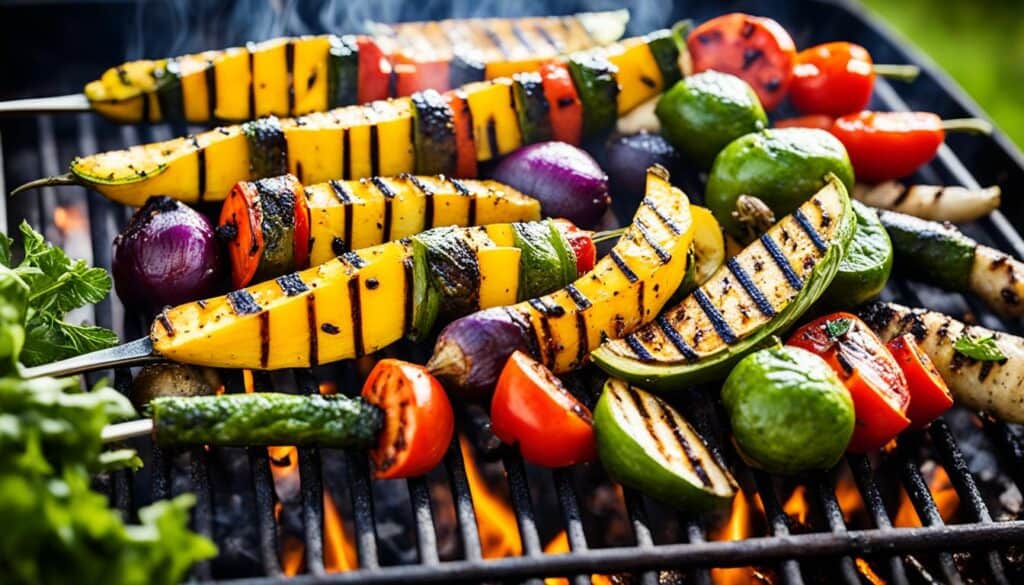
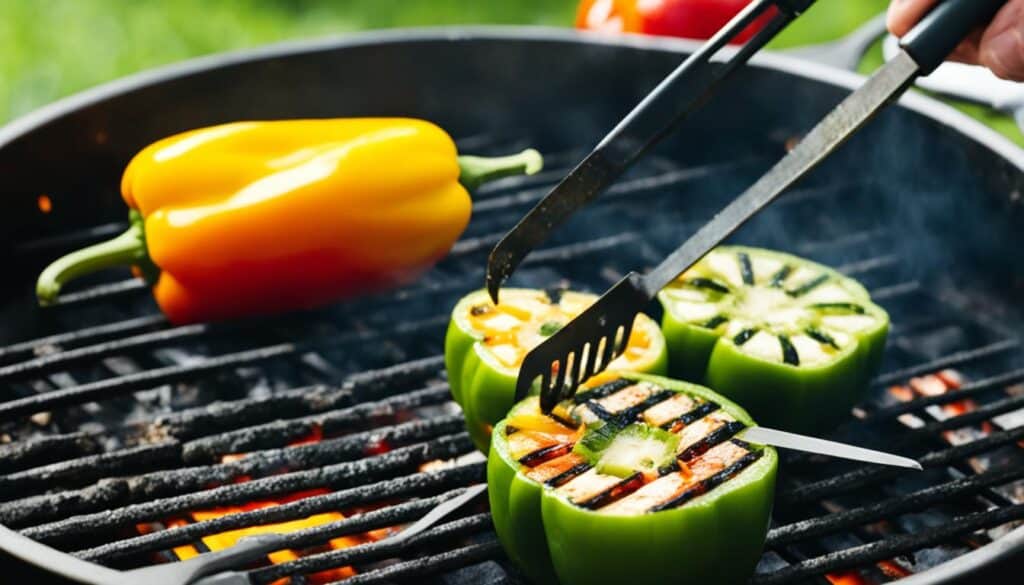



Leave a Reply